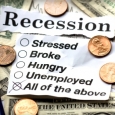Unemployment Insurance
Unemployment insurance (UI) is an essential part of the American social safety net. UI gives laid-off workers time to find or retrain for a new job while ensuring their purchasing power (this is especially important during economic downturns). The federal government first established nation wide coverage with the Social Security Act of 1935. Under this system states play a crucial role, jointly financing and administering the program with the federal government. Generally, benefits last a total of 26 weeks. During recessions extensions are typically issued, although conservatives often attempt to block the legislation.
Commentary
Cry Wolf Quotes
…it still is true that the young people of today in this country look to the people who have succeeded in spite of every handicap such as that, as their inspiration for doing things. I think we do not want to kill off that spirit of individualism. I use the term ‘individualism’; I know it is sneered at a lot, but I know if is still a respectable term and I think we ought to cultivate it instead of sneering at it.
This bill will cause further migration from the farm areas to the industrial areas and will invite the transfer of workers from the class of those not gainfully employed in order to share in the unemployment benefits…Unemployment insurance, which in many instances places a premium on indolence, would unquestionably defeat this proposed plan of the administration to place workers in the areas of lower living costs and keep them gainfully employed.
…finally, it is paternalistic and incompatible with our fundamental conception of democracy.
…in regard to the ultimate consequence of this legislation, that is leaving aside the effect that might be produced this year or next year, on pay rolls, we wish to point out the added incentive it creates for the more rapid introduction of labor-saving machinery for the definite purpose of reducing the total taxable pay roll and thus add to the unemployment....Further there is always a maximum labor cost that any industry can meet and there will be a definite increased tendency for employers to consider this tax as a part of the wages of their employees and keep the direct wage paid as low as possible to reduce such wage by the size of the tax itself; I am indicating that only as a natural business tendency.
Related Laws and Rules
Evidence
-
San Francisco Fed Finds Unemployment Insurance Doesn't Significantly Contribute to Unemployment Levels
Unemployment insurance doesn't encourage people to stay jobless.
-
Moody’s Analytics Advocates Unemployment Insurance as Stimulus
For every $1 spent on unemployment benefits, GDP increases by $1.61.
-
Congressional Budget Office Says Unemployment Benefits Have Strongest Stimulative Effect
Unemployment benefits make macroeconomic sense during a recession.
Backgrounders & Briefs
Unemployment Policy Brief: Shermer
By Elizabeth Tandy Shermer, PhD, February 2010
Unemployment insurance benefits – including their length, eligibility, and expense – are again in the spotlight. The arguments are hardly new.
Resources
Center for Economic and Policy Research (CEPR) is a progressive think tank that concentrates on social and economic policy, both domestic and international.
The National Employment Law Project is an organization that promotes economically just public policy in the face of the prevailing trends of the law several decades.


